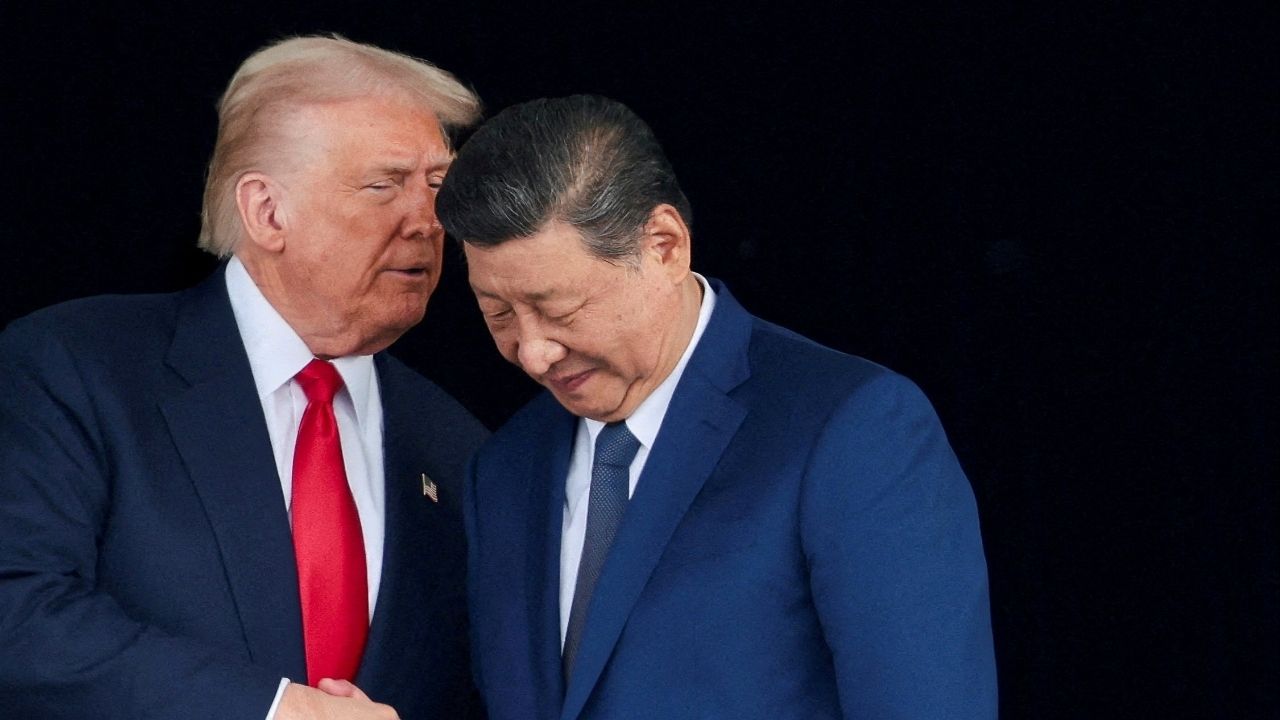President Donald Trump and Chinese President Xi Jinping talk as they leave after a bilateral meeting at Gimhae International Airport, on the sidelines of the Asia-Pacific Economic Cooperation (APEC) summit, in Busan, South Korea, October 30, 2025. (Reuters File)
Share
|
Getting your Trinity Audio player ready...
|
China will suspend retaliatory tariffs on U.S. imports, including duties on farm goods, after last week’s meeting of the two countries’ leaders, Beijing confirmed on Wednesday, but imports of U.S. soybeans still face a 13% tariff.
The tariff commission of the State Council, or cabinet, will scrap duties of up to 15% imposed on some U.S. agricultural goods from November 10, while keeping levies of 10% introduced in response to President Donald Trump’s “Liberation Day” duties.
Investors on both sides of the Pacific were relieved when Trump met Chinese leader Xi Jinping in South Korea, easing fears that the world’s two largest economies might abandon talks to resolve a tariff war that has disrupted global supply chains.
Trump and the White House were quick to issue their take on the meeting, but the Chinese side did not immediately give a detailed summary of what it had agreed.
“Broadly, it’s a great sign that the two sides are making rapid progress in putting the deal into effect,” said Even Rogers Pay, a director at Beijing-based Trivium China.
“It shows they’re aligned and that the agreement is likely to hold up.”
U.S. soybean futures reached their highest level since June 2024 on hopes for Chinese buying.
However, Beijing’s decision to leave its 13% tariff on soybeans keeps U.S. shipments to China too expensive for commercial buyers, compared to Brazilian alternatives, analysts said.
“We don’t expect any demand from China to return to the U.S. market with this change,” said one trader at an international trading company. “Brazil is cheaper than the United States and even non-Chinese buyers are taking Brazilian cargoes.”
After the meeting, the White House said China would purchase at least 12 million metric tons of U.S. soybeans in the last two months of 2025 and at least 25 million tons in each of the next three years.
Beijing has yet to confirm those figures, and traders are watching closely for signs of large-scale purchases.
The White House and U.S. Department of Agriculture did not immediately respond to requests for comment on Wednesday.
Cheaper Brazilian Beans
Chinese importers recently bought 20 cargoes of cheaper Brazilian soybeans as South American prices eased on expectations of a resumption of U.S. sales to the world’s largest soybean importer.
With China’s tariff in place, U.S. soybeans are well over a dollar per bushel more expensive than Brazilian old-crop supplies, said Arlan Suderman, chief commodities economist for commodity firm StoneX.
Unless Beijing waives the retaliatory duty, China’s state grain buyer Sinograin will need to bear the burden of meeting the obligation of purchasing 12 million tons of U.S. soybeans by the end of the year, Suderman said. Sinograin is essentially immune to the tariff and makes purchases for China’s soybean reserve, he said.
“That would be an optimistic outlook for Sinograin to buy that quantity in such a short time,” he said.
Brazilian soybeans for December shipment were quoted at a premium of $2.25 to $2.30 over the January Chicago contract, compared with $2.40 a bushel being offered for U.S. beans shipped from the U.S. Gulf Coast, traders said.
Before last week’s meeting, state trader COFCO made China’s first purchases from this year’s U.S. harvest, an act analysts saw as a goodwill gesture.
In 2024, China bought roughly 20% of its soybeans from the United States, down from 41% in 2016, the year before Trump’s first presidential term, customs data showed.
This year, China has largely shunned U.S. crops from the autumn harvest due to high tariffs, costing American farmers billions of dollars in lost exports.
In a meeting with a U.S. agricultural trade delegation on Tuesday, China’s senior trade negotiator Li Chenggang attributed “fluctuations” in agricultural trade between the two countries to U.S. tariffs, a summary of the meeting issued by China’s commerce ministry showed.
China and the United States are “important agricultural trade partners”, Li said, adding that he hoped Washington could work with Beijing to create favourable conditions for cooperation.
China’s cabinet said it would also suspend for one year the 24% additional tariffs it imposed on U.S. goods in April.
China will also remove or suspend for a year some non-tariff retaliatory measures, including export control measures announced in March and April against some U.S. entities, the commerce ministry said on Wednesday.
—
(Reporting by Joe Cash, Ethan Wang and Ella Cao in Beijing, Naveen Thukral in Singapore, and Tom Polansek in Chicago; Editing by Lincoln Feast, Christopher Cushing and Clarence Fernandez)
RELATED TOPICS:
Categories

National Handgun Reciprocity Legislation Would Save Lives

















